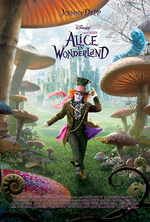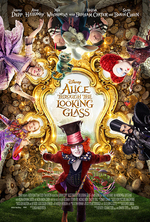Film Screening 13th August, 2016

Alice in Wonderland
5:00 PM, 13th August, 2016
- PG
- 108 mins
- 2010
- Tim Burton
- Linda Woolverton
- Mia Wasikowska, Johnny Depp, Anne Hathaway, Helena Bonham Carter
In 2010, I was the movie coordinator for the social club of a government department. As such, I booked an entire cinema for staff, their families and friends to watch Alice in Wonderland. For the first and only time in this role, I sold out every seat in the cinema. Why? My guess is the reasons were twofold:
1) Generations – grandparents, parents and children – had read and enjoyed Lewis Caroll’s original book; and
2) Johnny Depp was perfect casting as The Mad Hatter.
To match Carroll’s weird and strange ideas, Disney hired equally weird and strange director Tim Burton. Burton remained true to the spirit of Carroll’s books (including Carroll’s height-altering “Eat Me” and “Drink Me” comestibles). However, he also made significant alterations to the plot.
Alice here is no longer a child, but rather a young woman (Wasikowska) who has the grit and determination appropriate for a movie heroine. And every movie heroine needs an antagonistic movie villain. In this case, the villain is The Red Queen (a merger of Carroll’s Queen of Hearts / Red Queen characters) assisted by the dragon-like Jabberwocky, setting the stage for a whimsical visual treat as only Tim Burton can deliver.
Richard Hills

Alice Through the Looking Glass
7:00 PM, 13th August, 2016
- PG
- 113 mins
- 2016
- James Bobin
- Linda Woolverton
- Mia Wasikowska, Johnny Depp, Anne Hathaway, Sacha Baron Cohen
Well, you can’t fault this film for failing to deliver on its promises: Alice does indeed go through a looking glass (and not in a shards-of-glass-everywhere kind of way). Apart from that, any links between this sequel and Lewis Carroll’s literary sequel are tenuous.
Wonderland in these Disney movies functions more like Narnia than Carroll’s creation: not a place to bludgeon a poor girl senseless with riddles and paradox, but a place with people we could conceivably like, and somewhere that Alice can get an external perspective on her life in the real world. And she has a life in the real world: she is not a child but an adult, and not even childlike so much as Bohemian. In this sequel she’s recalled to Wonderland to bring the increasingly Mad Hatter out of his malaise, which involves, to squash the exposition as flat as possible, travelling through time.
…With the inadvertent help of Time himself (Baron Cohen), who is by far the best reason to see the film: drily funny, regally indifferent, and with priceless expressions of weary tolerance every time he listens to someone make yet another joke about his name. The film is ostensibly about the tender relationship between Alice (Wasikowska) and the Hatter (Depp); but this time (this TIME! Ha!) it’s Baron Cohen who walks away with the movie and even, I suspect, Alice’s heart.
Henry Fitzgerald